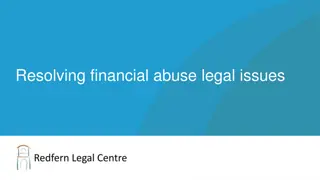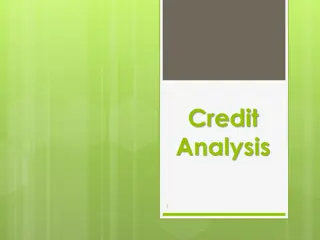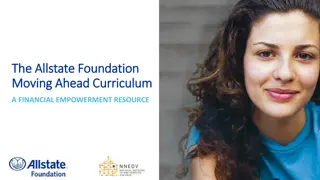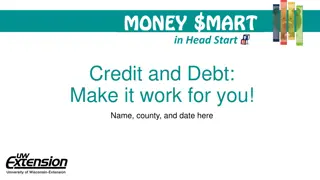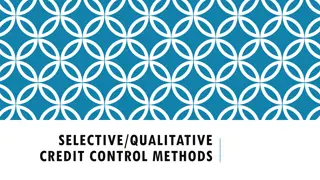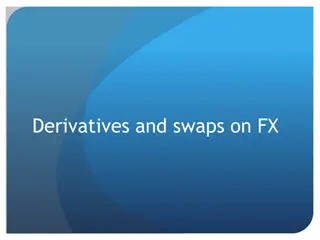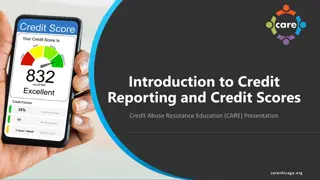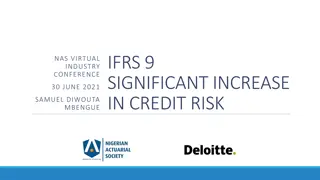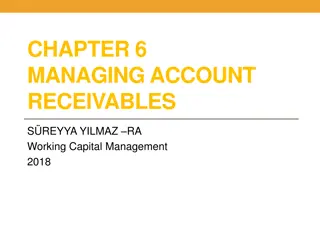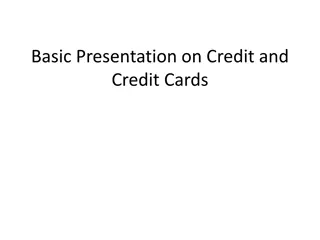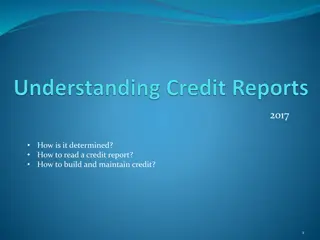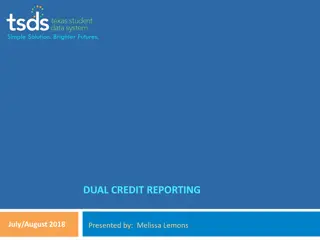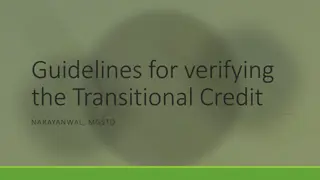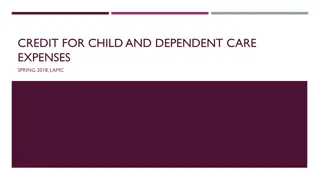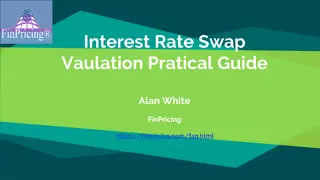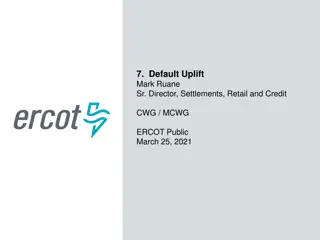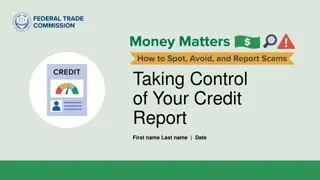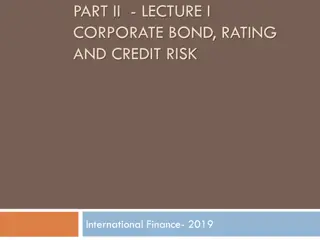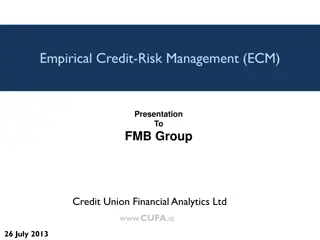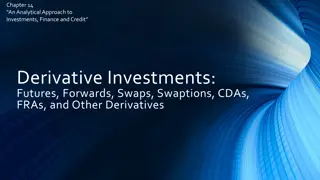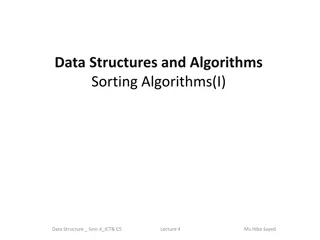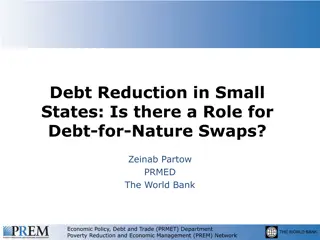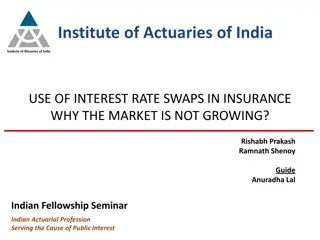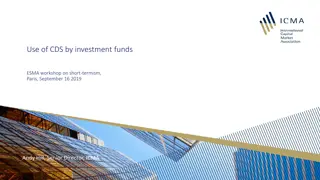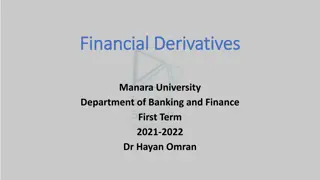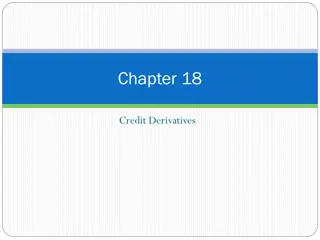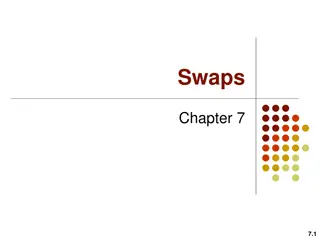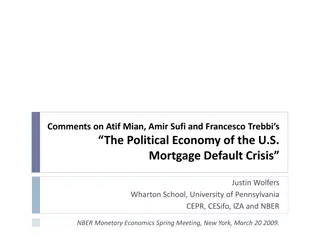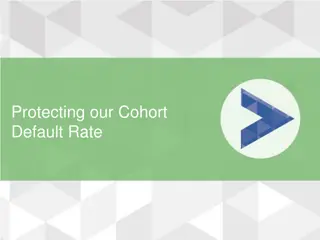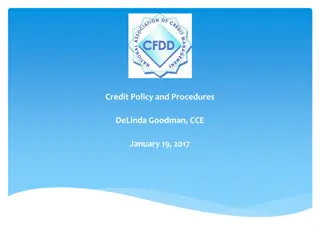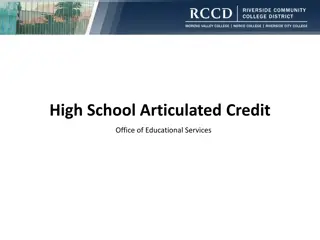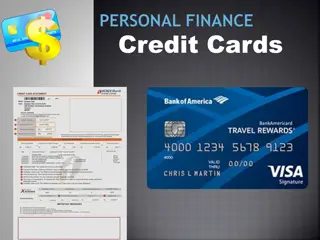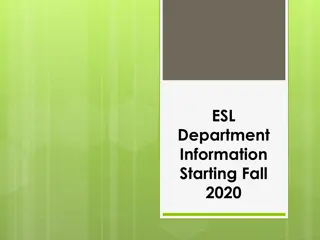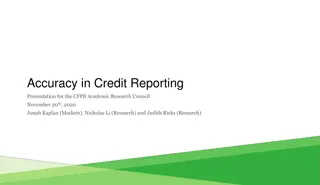Dual Credit Options at Champion High School
Champion High School offers Advanced Placement (AP) and Dual Credit programs in partnership with various institutions like Northwest Vista College, Angelo State University, UT On-Ramps, and Tarleton Today. Students can earn college credit by meeting testing requirements, with some classes being free
1 views • 14 slides
Resolving Financial Abuse: Legal Issues and Consumer Credit Law
Learn about resolving legal issues related to financial abuse, consumer credit law, crafting financial hardship requests, negotiating with creditors, getting specialist legal advice, and testing your knowledge on financial matters. Gain insights into consumer credit law, the National Consumer Credit
0 views • 67 slides
Understanding Credit Analysis for Farmers and Fishers
Credit analysis is crucial for farmers and fishers to access the right amount of credit at the right time. Economic feasibility tests such as returns on investment, repayment capacity, and risk-bearing ability are essential factors to evaluate credit worthiness. The 3Rs of credit - returns, repaymen
0 views • 30 slides
Understanding Credit Reports and Scores: A Comprehensive Overview
Explore the importance of credit reports and scores in financial empowerment through modules on reviewing credit reports, understanding credit scores, and mastering credit basics. Learn how good credit can impact your ability to obtain loans, credit cards, secure rentals, insurance coverage, and emp
3 views • 35 slides
Mastering Credit and Debt in Head Start Program
Understand the complexities of credit and debt to make informed financial decisions. Learn about different types of credit, pros and cons of credit cards, debit cards, prepaid cards, and secured credit cards. Gain insights on how to manage your finances effectively and build a strong credit history
0 views • 29 slides
Qualitative Credit Control Methods Explained
Selective/Qualitative credit control methods involve regulating the quality and direction of credit flows by implementing controls such as ceilings on credit, margin requirements, discriminatory interest rates, directives, direct action, and moral suasion. These methods are used by central banks lik
0 views • 7 slides
Understanding Futures and Swaps in FX Markets
Exploring the world of FX derivatives such as futures, options, and swaps, with insights into how futures contracts differ from forward contracts, the concept of long squeezes in the oil market, and the risks associated with specific investment products like Crude Oil Treasure. Discover the intricac
0 views • 47 slides
Understanding Credit Reporting and Credit Scores in CARE Presentation
Explore the essential concepts of credit reporting and credit scores in the context of Credit Abuse Resistance Education (CARE). Learn about credit history, its impact on financial decisions, ways to establish credit, the significance of credit reports, and how credit behaviors affect one's financia
0 views • 21 slides
Understanding IFRS 9 Significant Increase in Credit Risk
Explore the principles and indicators of Significant Increase in Credit Risk (SICR) under IFRS 9, including assessment methods, change in risk of default, and timing considerations. Learn about lifetime expected credit losses, rebuttable presumptions, and common indicators of credit risk escalation
4 views • 19 slides
Managing Account Receivables in Business Operations
Firms commonly offer credit terms to clients, creating trade credit and receivables. High trade receivables signify investment in clients, balancing sales growth with risks of bad debts and credit default. Efficient management of receivables is crucial for optimizing working capital and minimizing c
2 views • 31 slides
Understanding Credit Cards: A Beginner's Guide
Explore the basics of credit cards, including how they work, differences from debit and prepaid cards, obtaining one, and building credit. Learn about credit character, revolving credit, and tips for getting approved for a credit card. Discover the importance of good credit and income when applying
0 views • 20 slides
Understanding Credit Reports and Building Credit in 2017
Understanding credit reports is essential for financial well-being. A credit report is a record of your payment history on loans and credit cards. This report is used to calculate your credit score, which determines your creditworthiness. Building and maintaining credit involves making payments on t
5 views • 22 slides
Dual Credit Reporting Guidelines for College Courses
Dual Credit Reporting provides definitions, guidelines, and validation rules for reporting college courses that allow students to earn both high school and college credit. Key elements covered include credit indicators, college credit hours, course sequencing, and validation rules to avoid overrepor
0 views • 6 slides
Guidelines for Verifying Transitional Credit and Important Authorities' Orders
The guidelines for verifying transitional credit include directives from the Hon'ble Supreme Court, the opening of a common portal for filing forms, the verification process timeline, and the reflection of approved transitional credit in the Electronic Credit Ledger. Relevant orders and circulars fr
1 views • 19 slides
Understanding Child and Dependent Care Expenses Credit
The Child and Dependent Care Expenses Credit allows taxpayers to reduce their tax liability by a portion of expenses incurred for caring for qualifying persons. Qualifying persons include children under 13, incapacitated spouses or dependents, and certain criteria must be met to claim the credit. Th
8 views • 10 slides
Understanding Recovery of Willful Default in Mortgages through NAB
This content discusses the National Accountability Ordinance (NAO) of 1999 and the concept of willful default in the context of mortgages. It covers the need for recovery, the definition of default, and key definitions outlined in NAO. The focus is on eradicating corruption and holding individuals a
0 views • 40 slides
Practical Guide to Interest Rate Swap Valuation by Alan White
Understand the concept of interest rate swaps, their practical applications, valuation methods, and real-world examples. Learn about swaplets, fixed and floating legs, and how swaps can be used to manage interest rate exposure.
3 views • 11 slides
Understanding ERCOT Default Uplift and Payment Procedures
ERCOT's default uplift and payment procedures involve handling short-paying invoice recipients, implementing payment plans, and collecting total short pay amounts from QSEs and CRRAHs. Default uplift invoices may be issued after 90 days of a short pay, with a maximum cap of $2.5 million per monthly
0 views • 7 slides
Take Control of Your Credit Report: A Comprehensive Guide
Learn how to take control of your credit report, understand why it matters, spot credit repair scams, and fix mistakes. Discover why your credit history is important and how to get your free credit reports. Explore the significance of your credit score, review your credit reports, and know how to ha
0 views • 16 slides
Understanding Corporate Bond Ratings and Credit Risk in International Finance
Corporate bond ratings provide signals on default probability, impacting borrowing costs. Higher ratings signify lower risk and interest rates. Credit spreads measure the difference between risky bonds and risk-free assets, with risk-free assets like US Treasury bonds seen as default-free. The longe
1 views • 19 slides
Empirical Credit Risk Management at FMB Group Credit Union
Empirical Credit-Risk Management (ECM) presentation to FMB Group Credit Union by Financial Analytics Ltd discusses the background, traditional forecasting methods, income and risk recognition, provisioning approaches, and benefits for credit unions. ECM offers expert retail credit risk management th
0 views • 25 slides
Understanding Forwards, Futures, and Swaps in Investment Finance
Dive into the world of investments with a detailed analysis of forwards, futures, and swaps. Discover how these derivatives work, their key characteristics, and practical examples of how they are utilized for hedging and risk management in the financial markets.
1 views • 36 slides
Introduction to Bubble Sort Algorithm
Bubble sort is a simple comparison-based sorting algorithm that repeatedly compares adjacent elements and swaps them if they are in the wrong order. It is easy to implement but inefficient for large datasets. The algorithm iterates through the list multiple times until no more swaps are needed, ensu
0 views • 16 slides
Debt-for-Nature Swaps: A Solution for Small States' Debt Challenges
Debt-for-Nature Swaps offer an innovative approach to addressing debt challenges in small states by converting debt into funding for conservation activities. While these swaps have potential benefits, their contribution to debt reduction has been limited. Despite generating significant funds for nat
0 views • 12 slides
Understanding Derivatives and Swaps: A Comprehensive Overview
Explore the concepts of derivatives and swaps, including their types, features, and the swap market. Delve into the details of how derivatives are used as contracts based on underlying financial assets, while swaps involve the exchange of financial instruments between parties. Learn about different
0 views • 20 slides
Understanding the Use of Interest Rate Swaps in Insurance Industry
This presentation delves into the world of interest rate swaps (IRS), their types, regulations, and market overview in the insurance sector. It explores why the IRS market is not growing despite its potential benefits. The content covers IRS basics, variations in types, regulatory guidelines, and ke
0 views • 21 slides
Use of Credit Default Swaps (CDS) by Investment Funds
Presentation at the ESMA workshop discussed the potential benefits and costs of using Credit Default Swaps (CDS) by investment funds. It highlighted the various uses of CDS, including risk management, alternative liquidity, and investment strategies. Evidence shows that a small percentage of UCITS f
0 views • 6 slides
Understanding Financial Derivatives: An Overview of Forward Contracts, Futures, Options, Swaps, and Credit Derivatives
Financial derivatives play a crucial role in managing risk and speculation in financial markets. This overview covers the definitions and characteristics of forward contracts, futures contracts, options (calls and puts), swaps, and credit derivatives. Swaps involve exchanging payments over time, whi
1 views • 23 slides
Understanding Funding Grid and Commitment Accounting in ConnectCarolina
Learn about lump sum payments, funding swaps, and essential processes in ConnectCarolina. Explore how to use the funding grid, enter payments, swaps, and chartfield rules. Discover the role of Commitment Accounting in managing employee funding effectively. Enhance your ConnectCarolina knowledge and
0 views • 64 slides
Retroactive Funding Swaps: Addressing Financial Issues in ConnectCarolina
ConnectCarolina faced challenges with inaccurate distribution of labor expenses, leading to complications in encumbrances and suspense accounts. A new tool for retroactive funding swaps is introduced to rectify these issues with a focus on improving compliance and accurate financial tracking, especi
0 views • 41 slides
Understanding Credit Derivatives and Managing Credit Risk
This chapter delves into credit derivatives, exploring their purpose, types such as credit default swaps and total return swaps, and the development of the market over the years. It discusses credit risk, problems associated with it, methods for estimating credit risk, and the role of credit derivat
0 views • 35 slides
Understanding Interest Rate and Currency Swaps
Introduction to interest rate swaps (IR) and currency swaps, covering definitions, examples, reasons for use, valuation, payoffs, credit risk, and other swap types. Details include the concept of swaps, calculation of cash flows, and a focus on interest rate swaps with examples and cash flow illustr
0 views • 63 slides
Analysis of Political and Economic Factors in the U.S. Mortgage Default Crisis
This research paper by Justin Wolfers delves into the correlations between voting patterns, constituent interests, and economic conditions amidst the U.S. Mortgage Default Crisis. It highlights how legislators respond to constituent interests, including voting for bills that impact mortgage default
0 views • 24 slides
Understanding Cohort Default Rates in Federal Student Loans
This document discusses the importance of protecting the cohort default rate in educational institutions for financial well-being of students and safeguarding federal funding. It explains the cohort default rate equation and provides insights into the cohort year 2013 data. The visuals and informati
0 views • 26 slides
Market Credit Working Group Update to Wholesale Market Subcommittee
The Market Credit Working Group provided updates to the Wholesale Market Subcommittee regarding NPRR review, focusing on NPRR 1088 which addresses credit impacts related to the elimination of RFAF and DFAF applications to prior and ongoing market positions. The discussion revolved around ERCOT credi
0 views • 8 slides
Understanding the Importance of Credit Policies in Business Operations
A credit policy/manual serves as a comprehensive guide detailing rules, regulations, and procedures within a company. It helps new employees understand the company's credit processes and establishes clear guidelines for decision-making. Without a credit policy, conflicts may arise in approving credi
0 views • 9 slides
Understanding High School Articulated Credit: Benefits, Transferability & Responsibilities
High school articulated credit allows students to earn college credit by aligning high school CTE classes with college-level courses. This collaboration between high school teachers and college professors can save students time and money by reducing the need to repeat coursework in college. Students
0 views • 8 slides
All About Credit Cards: A Comprehensive Guide
Explore the world of credit cards, from understanding the basics to managing credit wisely. Delve into the advantages and disadvantages, learn about different types of credit cards, and discover how to use credit cards responsibly. Discuss whether high school students, college students, and adults s
0 views • 36 slides
Comprehensive Information on ESL Department's Fall 2020 Offerings
Explore ESL class options starting Fall 2020, including credit vs. non-credit courses, new course offerings, course numbering system, differences between credit and non-credit classes, and more. Discover details on certificates, financial aid, graduation, and transfer information, with insights on c
0 views • 12 slides
Evolution of Credit Reporting and Consumer Awareness
Credit access is crucial for consumers, yet inaccurate credit reporting can have significant impacts on credit scores. Studies show that errors in credit reports are common, with many consumers disputing inaccurate information. The regulatory landscape has evolved since the 2012 FTC study, with incr
0 views • 10 slides

